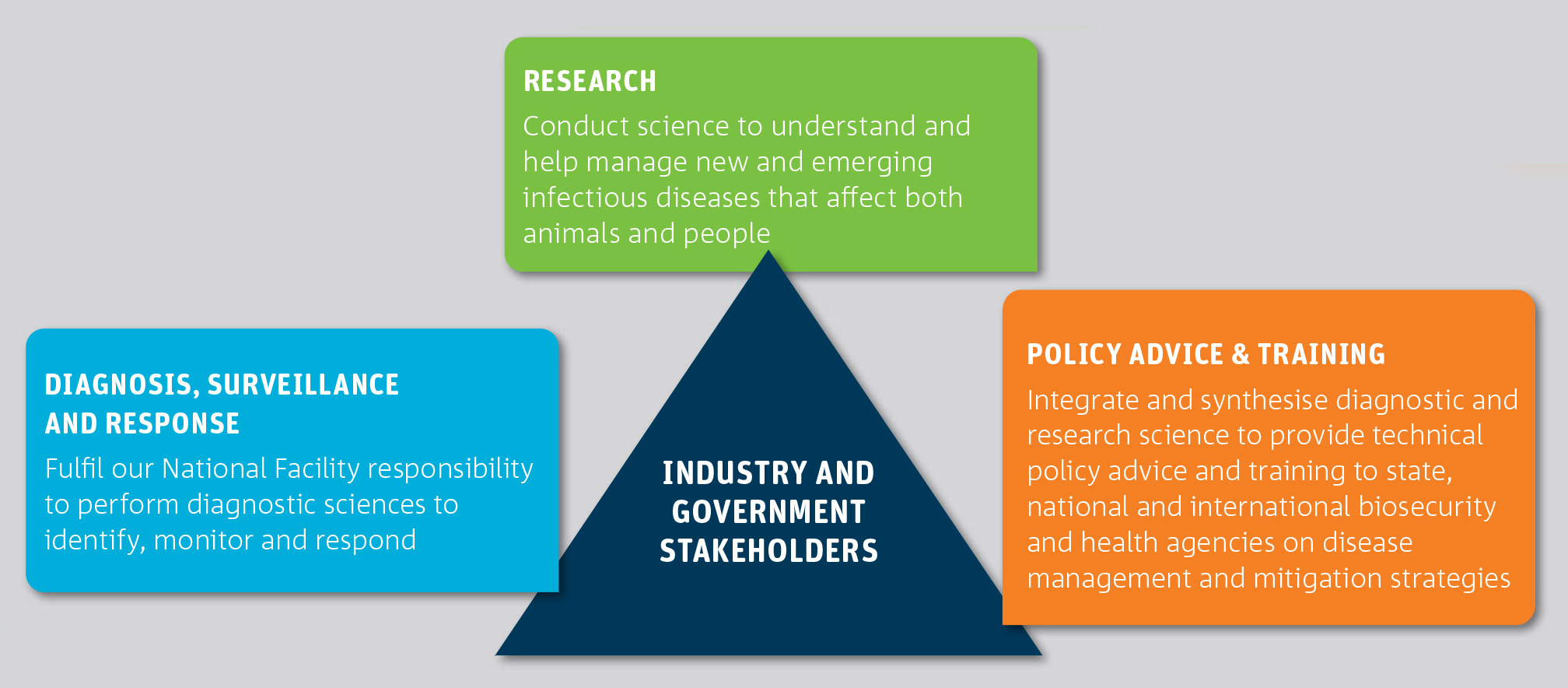We play a vital role in maintaining the health of Australia's animals, the international competitiveness of Australian agriculture and trade, the well-being of Australians and the quality of our environment.
In recent years, we have become a world leading 'One Health' laboratory due to the extent of work we conduct on zoonotic agents – those viruses that can pass from animals to humans. We work extensively on Avian influenza and our scientists were instrumental in identifying and characterising the new Hendra and Nipah viruses and helped identity that SARS too originated in bats.
Our responsibilities as a National Facility to industry and government stakeholders can be summarised into three main areas:
- Research - conduct science to understand and help manage new and emerging infectious diseases that affect both animals and people
- Policy advice and training - integrate and synthesise diagnostic and research science to provide technical policy advice and training to state, national and international biosecurity and health agencies on disease management and mitigation strategies
- Diagnosis, surveillance and response - fulfil our National Facility responsibility to perform diagnostic sciences to identify, monitor and respond

Our partners and funding
Most of our work is conducted within the secure walls of our high containment facility which is one of the most sophisticated laboratories in the world for the safe handling and containment of animal and zoonotic diseases.
Through partnerships with the World Organisation for Animal Health (OIE), the World Health Organization (WHO) and the Food and Agriculture Organization of the United Nations (FAO), ACDP is an accredited reference laboratory and collaborating centre for a range of diseases.
The international research community is able to access ACDP's high containment laboratories and specialist services for studies on infectious diseases that affect the health of animals and humans.
This national facility is funded by the Australian Federal Government, via CSIRO and the Australian Federal Government Department of Agriculture and Water Resources (DAWR). We also generate revenue from industry organisations and commercial companies.
We play a vital role in maintaining the health of Australia's animals, the international competitiveness of Australian agriculture and trade, the well-being of Australians and the quality of our environment.
In recent years, we have become a world leading 'One Health' laboratory due to the extent of work we conduct on zoonotic agents – those viruses that can pass from animals to humans. We work extensively on Avian influenza and our scientists were instrumental in identifying and characterising the new Hendra and Nipah viruses and helped identity that SARS too originated in bats.
Our responsibilities as a National Facility to industry and government stakeholders can be summarised into three main areas:
- Research - conduct science to understand and help manage new and emerging infectious diseases that affect both animals and people
- Policy advice and training - integrate and synthesise diagnostic and research science to provide technical policy advice and training to state, national and international biosecurity and health agencies on disease management and mitigation strategies
- Diagnosis, surveillance and response - fulfil our National Facility responsibility to perform diagnostic sciences to identify, monitor and respond
Our partners and funding
Most of our work is conducted within the secure walls of our high containment facility which is one of the most sophisticated laboratories in the world for the safe handling and containment of animal and zoonotic diseases.
Through partnerships with the World Organisation for Animal Health (OIE), the World Health Organization (WHO) and the Food and Agriculture Organization of the United Nations (FAO), ACDP is an accredited reference laboratory and collaborating centre for a range of diseases.
The international research community is able to access ACDP's high containment laboratories and specialist services for studies on infectious diseases that affect the health of animals and humans.
This national facility is funded by the Australian Federal Government, via CSIRO and the Australian Federal Government Department of Agriculture and Water Resources (DAWR). We also generate revenue from industry organisations and commercial companies.
